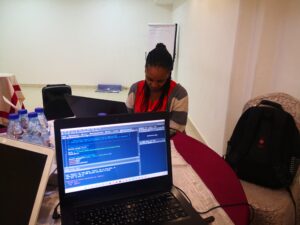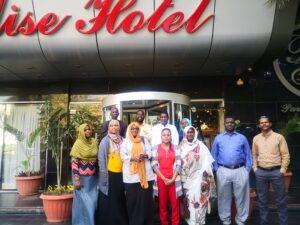INTRODUCTION
The training workshop took place from 13th to 20th December, 2021, the first three days spend at the Sudan Meteorological Authority (SMA) premises to install the RegCM model and the rest at Paradise hotel from 16th to 20th December. The training was meant to build the capacity of the SMA to conduct climate change downscaling. The first three days involved the configuration of the models and tools needed for dynamical and statistical downscaling. The consultant had been informed beforehand that Food and Agriculture Organisation, Sudan (FAO-Sudan) had purchased three servers to be installed at the SMA premises. These servers would be used to perform the climate change downscaling tasks. The international consultant together with the SMA technical staff successfully installed the Regional Climate Model system (REgCM) regional climate model (RCM) and downscaled climate data for a few days. The training was then moved to the Paradise Hotel in Khartoum where the rest of the workshop was conducted.
Objectives
The main objective of the workshop was to equip the SMA team with the knowledge and tools required to perform climate change downscaling using an RCM. The specific objectives required to achieve this were:
- To conduct data quality control of observed rainfall and temperature.
- To demonstrate the process of dynamical downscaling using the REgCM model.
- To present different sources of climate projection data from known RCMs.
- To analyse NETCDF format data using Climate Data Operators (CDO) tools.
- To visualize NETCDF climate data using the Grid Analysis and Display System (GrADS) software.
- To determine the temporal trend of climate data.
- To statistically downscale GCM data to station level using R program.
Expected Outcomes
- Enhanced ability to conduct climate data quality control.
- Ability to downscale climate data using a regional climate model.
- Knowledge of different data stores for climate projection data gained.
- A better understanding of the NETCDF data type and how to analyse it.
- Ability to visualize processed climate data.
- Ability to determine the temporal trend of climate data.
- Ability to conduct statistical climate downscaling.
Participants and Gender Balance
The participants had been well selected. There was a good balance between male and female. The participants were mostly young and running key operations at the SMA, therefore, they would be able to easily apply the knowledge learned to their duty stations.
Training Workshop Topics Summary
The following topics have been discussed and explained in detailed during the training period:
- Quality control of climate data.
- Regional climate modelling.
- CORDEX Data Access.
- Data Analysis using CDO.
- Data Visualization using GrADS.
- Trend Analysis and Statistical Down-scaling.
- Evaluation and Recommendations
Evaluation and recommendations
It was a lot of activity for 5 days so the consultant adjusted the training schedule to cater to this duration. The participants had to learn a lot in the few days, however, the consultant is confident they gained the skills needed to successfully perform climate projection downscaling on their own.
The participants should use the installed REGCM model to further understand how regional climate projection downscaling is conducted. The participants should run the model using different physics as initialization schemes and determine which best reproduces the observed rainfall and temperature in Sudan.

